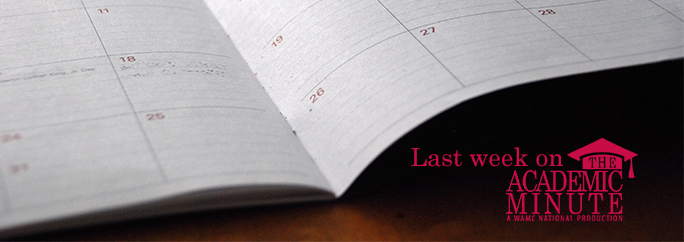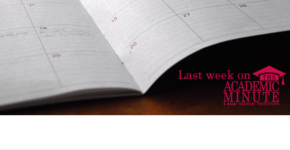
The Academic Minute from 04.15 – 04.19
Monday, April 15th
Michelle Amazeen – Boston University
Native Advertising
Dr. Michelle A. Amazeen is an assistant professor in the Department of Mass Communication, Advertising and Public Relations at Boston University. Prior to BU, Dr. Amazeen was an assistant professor of advertising at Rider University in Lawrenceville, NJ. She earned her Ph.D. in Mass Media and Communication from Temple University in Philadelphia and received a B.S. and M.S. in Advertising from the University of Illinois at Urbana-Champaign.
Tuesday, April 16th
Joseph Reagle – Northeastern University
Life Hacking
Joseph Reagle is an Associate Professor of Communication Studies at Northeastern. He’s been a resident fellow at the Berkman Klein Center at Harvard (in 1998 and 2010), and he taught and received his Ph.D. at NYU’s Department of Media, Culture, and Communication. As a Research Engineer at MIT’s Lab for Computer Science he served as an author and working group chair within the IETF and W3C on topics including digital security, privacy, and Internet policy. He also helped develop and maintain W3C’s privacy and intellectual rights policies (i.e., copyright/trademark licenses and patent analysis).
Wednesday, April 17th
Annmarie Cano – Wayne State University
Relational Flexibility
Annmarie Cano, Ph.D. is Professor of Psychology and Associate Provost for Faculty Development and Faculty Success at Wayne State University. Dr. Cano conducts research on emotion regulation and intimacy in couples facing chronic illness and has developed a mindfulness-based intervention aimed at couples with pain improve their quality of life. Dr. Cano has over 70 publications and has served as PI on grants from the National Institutes of Health. She is a Fellow of the American Psychological Association in two divisions (Society for Health Psychology and Society for Couple and Family Psychology). As a first-generation college student and Latina, Dr. Cano is committed to supporting access, diversity, and inclusion in higher education. In her current role, she develops career, mentoring, and leadership development programs for faculty and academic staff. She earned her master’s and doctoral degrees in psychology from Stony Brook University and her bachelor’s degree in psychology from Princeton University.
Thursday, April 18th
Leonard Jason – DePaul University
Community Psychology
Leonard Jason is a professor of clinical and community psychology in DePaul University’s College of Science and Health. He’s also the director of DePaul’s Center for Community Research. A DePaul faculty member since 1975, Jason’s research interests include chronic fatigue syndrome and myalgic encephalomyelitis, recovery homes, school violence and methods for prevention, smoking and methods for prevention, media interventions, children and media, and community building. He’s an editorial board member for the Journal of Community Psychology, the Journal of Prevention and Intervention in the Community, the Journal of Health Psychology, and Fatigue: Biomedicine, Health & Behavior. He’s the author of the 2013 book “Principles of Social Change.” Jason holds a Bachelor of Arts in psychology from Brandeis University and a doctorate in clinical and community psychology from the University of Rochester.
Friday, April 19th
Edwin Stafford – Utah State University
Air Pollution Posters
Edwin R. Stafford, Ph.D., [[email protected]] is a marketing professor at the Jon M. Huntsman School of Business at Utah State University who researches the entrepreneurship, marketing, and diffusion of clean energy, innovations, and products. He co-leads the annual Utah High School Clean Air Poster Contest with Dr. Roslynn Brain McCann (Utah State University Extension Sustainability) to engage hundreds of teens across the state about local air pollution and driving and transportation strategies to prevent it. Surveys indicate that teens report a greater willingness to engage in clean air actions as a consequence of contest, and they also influence their parents’ driving behaviors in what is called the “Inconvenient Youth” effect. For more information, go to cleanaircontest.usu.edu.
